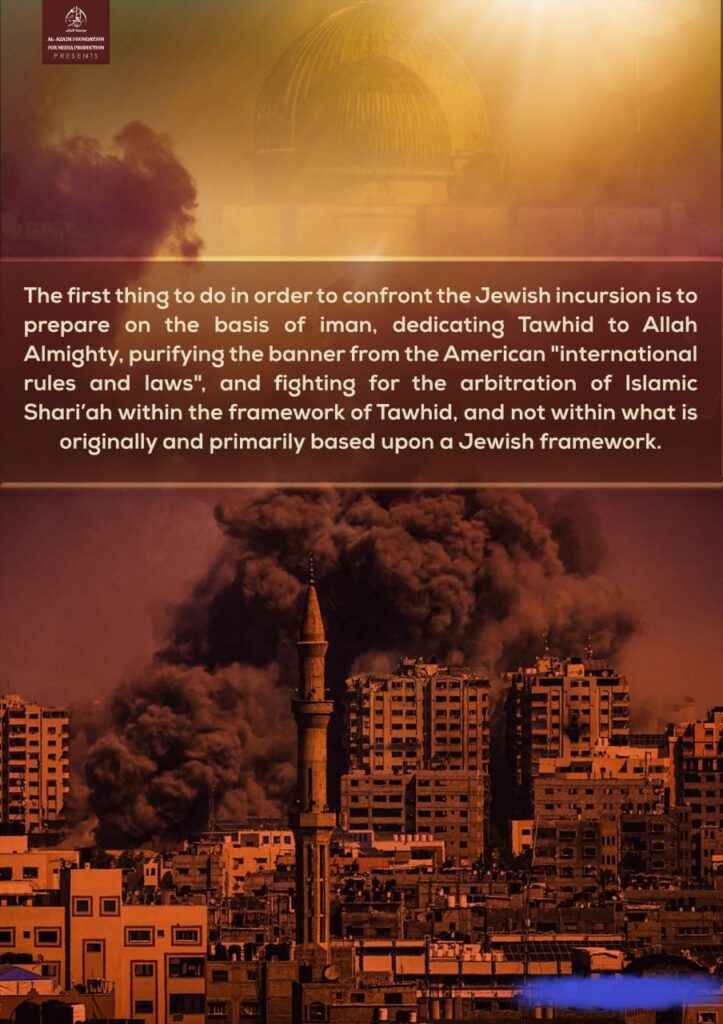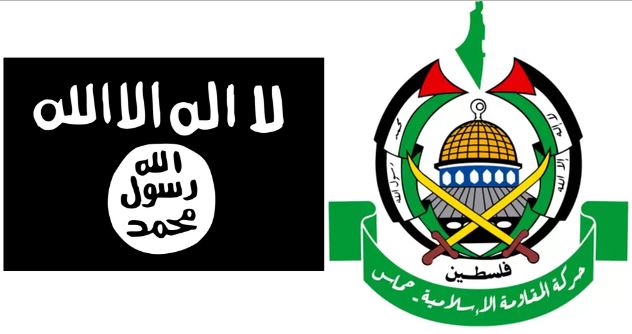The horrific October 7th terrorist attacks by Hamas against Israel, again reignited the worlds focus on terrorist organizations and the sectarian divisions that divide the Middle East. Many commentators have gone so far as to compare Hamas to ISIS and at first glance the comparison may seem accurate. Both groups support a millenarian world view, wish for the destruction of Israel, slaughter innocent civilians and suppress the rights of those they govern. However such judgment could not be further from the reality of their divergent beliefs and opinions.

Religious Divisions
Hamas or Ḥarakat al-Muqāwamah al-Islāmiyyah (Islamic Resistance Movement), follows the Sunni school of Islam along with approximately 93% of Gaza. At its core the Sunni school believes in the lineage of the Rashidun (Rightly Guided Caliphs) and rejects the suzerainty of Ali and his decedents (Shi’ism). This is the same as ISIS and Al-Qaeda (AQ) however Hamas differ in their application of these beliefs and take what some might call a more practical stance. The key focus of Hamas’s activity is the establishment of a Palestinian state for the people of Palestine. To this end Hamas have been committed to delivering this goal by whatever means, be that militarily or politically. Following the Second Intifada (violent clash between Israel and Hamas) Hamas was able to take a leading role and demonstrate a level of moderation that made them very popular amongst the Palestinian population. In January 2005, Hamas won 77 of 118 contested seats in municipal elections in the Gaza Strip, and in January 2006, Hamas candidates won 74 seats in the 132-member Palestinian parliament, taking control of the Palestinian Authority. Thus since 2006 Hamas have thus been the ruling political party in Gaza.
Al-Qaeda admonished Hamas for their participation in elections at the time for failing to correctly follow Sunni religious rulings as they saw appropriate. This was due to Al-Qaeda as a Salafi-Jihadist group, following a strict interpretation of Islam based on its founding principles and seeking to proselytize this vison globally through violence. To AQ, Hamas had undermined a core concept Sunni Islam, Tawheed1. Tawheed is the belief in the oneness of God and divine right of God to legislate in all worldly matters and as such humans must supplicate themselves before him and all decisions on earth must be made in relation to religious cannon. It is believed amongst Salafi-Jihadist groups that participating in democratic elections is contrary to Tawheed and in extreme cases can invalidate a participants religion entirely. Following the election, al-Zawahiri issued a stern warning to the Hamas leadership, cautioning them that taking power was only valid when it was used to establish God’s rule on earth through implementing Shari`a (Islamic law). Any other form of government would be a different religion. Bin Ladin reiterated the warning a month later, supporting the objectives of Hamas while stating that it was impermissible to participate in “polytheistic councils.” In December 2006, al-Zawahiri’s tone was more combative, bluntly asserting that Hamas should never have participated in the elections at all as long as there was a secular, rather than Islamic, constitution in Palestine.
Another big difference between Salafi-Jihadi groups and Hamas is their adherence to the concept of Jihad as religious war. AQ and ISIS believe in global struggle that can only be achieved through the combating of all enemies of Islam simultaneously, ISIS of course taking the most extreme position here. By comparison Hamas have focused solely on the liberation of Palestinian land and the destruction of Israel, thus the accusation of Nationalism has been levelled at them by both groups. In recent times this has been most vociferously espoused by ISIS and has been a running theme in publications such as Voice of Khorasan and Al-Naba, where they have continually criticized the Taliban for their Nationalist focus and look to press similar accusations against Hamas.
Iranian Alliance
Compounding these issues is also the fact of Hamas’s close relationship with Iran, which at this point is essentially a full military alliance with many viewing Hamas as a proxy of the Iranian state. The alliance between the Iranian regime and Hamas in Gaza has been a significant factor in the ongoing conflict in the region. The relationship between the two entities dates back to the 1980s and has only strengthened over the years. Iran has been a key supporter of Hamas, providing financial, military, and logistical support to the Palestinian militant group. This support has allowed Hamas to build and maintain a formidable arsenal of weapons, including rockets and missiles, which it has used to target Israeli cities and towns, most clearly demonstrated by the October 7th terrorist attacks.
The big issue to ISIS is that this alliance with Iran undermines what they see as their righteous religious cause. ISIS hate Non-Muslims and Jews but more than this they hate the Shia, and Iran as the largest Shia nation is their number one enemy. As such to ISIS, Hamas are committing outright apostasy by making alliances with a state that to the former should be fought directly along sectarian lines. This was seen most viscerally in the internecine violence in Iraq, infamously headed up by Abu Musab al-Zarqawi in 2007, who was known as Sheikh of the Slaughterers for his blood lust in the killing of Shia. To this day one of ISIS’s primary focuses has been conflict with Shia force in Iraq, with ISIS hit squads targeting Shia government officials and tribal leaders or infrastructure.
This alliance places Hamas as a direct adversary to ISIS and makes any cooperation between the groups ideologically unpalatable. So whilst ISIS certainly agree with Hamas’ core objectives of destruction of the state of Israel and liberation of the Palestinian peoples. The close alliance with Iran means that any support for the group would undermine part of the groups core identity and as such invalidate and theological legitimacy the group seeks to project.
ISIS struggle to challenge Hamas
Recent events have clearly posed a significant challenge to ISIS ability to project itself in the global media narrative. Hama’s large scale terrorist attack on October 7th, has blown any activities by ISIS out of the water in its brutality, scale and horror. Thus it has captured the attention of much of the world and when combined with the plight of the Palestinian peoples and the nature of Israeli-Palestinian tensions, pushed any interest in ISIS activities off the news agenda. As a result ISIS clearly want to try and challenge this discourse and place themselves back in the public gaze.
However fitting in to the narrative on Gaza has proved very difficult for ISIS, this is mainly due to the divisions between themselves and Hamas as discussed in this article. The fact that ISIS is so ideologically opposed to Hamas has meant that the group has failed to effectively comment on the conflict and seems to have taken a strategically ambiguous stance towards the violence. This can be observed in many of the ISIS publications since October 7th. They have repeatedly commented on the conflict making broad statements about fighting the Jews and “crusader alliance,” yet never praising Hamas or the violence of October 7th itself. As such despite many commentators proclaiming that Hamas is just like ISIS, the reality on the ground is that the two groups could not be further from seeing eye to eye.
Another aspect that has certainly led to relatively weak responses from ISIS is that the group has observed how successful October 7th was from a Jihadist perspective and thus criticism of Hamas here would only seek to highlight the failures and weakness of ISIS current situation. Their messaging has therefore focused on calls for violence against the Jews whilst signaling the theological failures of Hamas without ever calling them out by name. For example observe the second image below and the ISIS messaging on fighting against the Jews but also with the message of “fighting for the arbitration of Islamic Shari’ah within the framework of tawhid, and not within what is originally and primarily based upon a Jewish framework.” This is a direct criticism of Hamas and it means that supporters should fight the Jews but also uphold Tawhid and not participate in any political process as was explained in the Religious Divisions section.


We can also observer the trajectory of ISIS over the last few years. As we have sought to highlight in our work, ISIS has evidently been in decline for some time and as such was already largely out of the global news cycle. This has meant that ISIS do not want to offer any praise to the work of Hamas as it would only go to highlight their own failures and inability to conduct an attack at the scale or destructive potential of Hamas. This has been keenly observed in ISIS lack of comment and omission of Hamas by name. It seems they are so concerned that Jihadist opinion is deeply in favor of Hamas, that even to mention them may cause their own failures to be openly highlighted against the backdrop of current events.
We can conclude that Hamas and ISIS despite sharing some geostrategic goas are diametrically opposed, these differences cover ideological, theological, strategic and sectarian lines. The current events in the Middle East have entrenched the divisions between Jihadist Terror groups and expose weaknesses across the milieu of violent jihadist insurgencies.
- Tawhid, the belief that there is only one God and He alone should be worshipped, is the core of Islam Salafi-jihadis believe a correct adherence to the principle of tawhid includes a literal obedience to all laws ordered upon man in the Qur’an and sunna. To rule by anything other than what Allah has revealed, they so frequently argue, is an act of apostasy. Only God is sovereign and only He can legislate or make laws. Following this line of reasoning, democracy is a foreign religion and a form of polytheism. Any Muslim who supports or engages in democracy, including elections under a democratic system, has therefore left true tawhid and become an apostate.
https://ctc.westpoint.edu/al-qaida-and-hamas-the-limits-of-salafi-jihadi-pragmatism/ ↩︎

